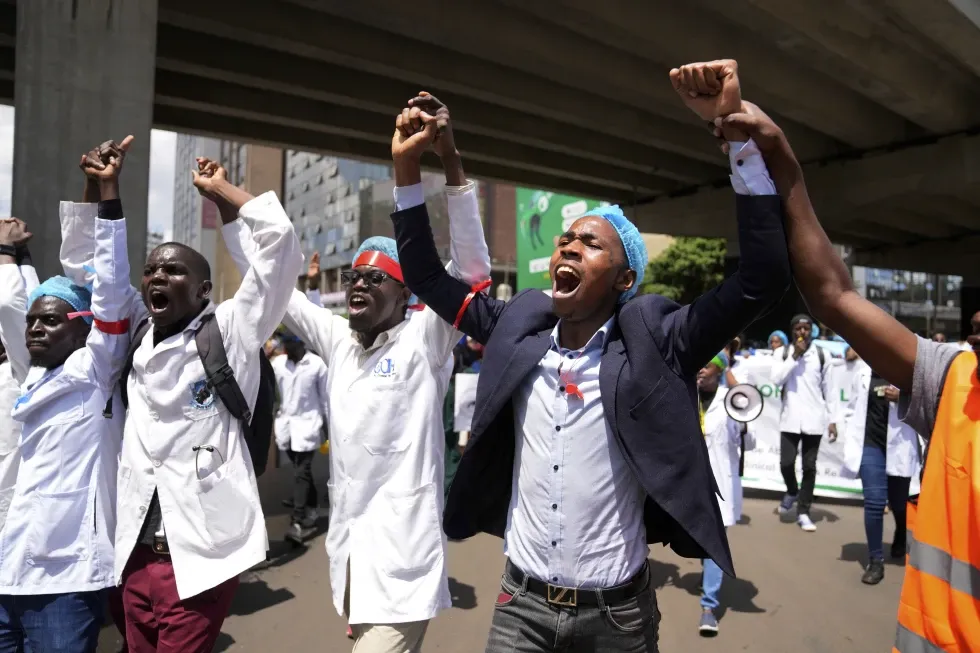Money, money, money
"You get sh77 million, you get $3.7 million and you get (a part of) $15 million!" — M-PESA, Amazon Web Services and the World Bank inject fresh cash into various health initiatives. Meanwhile, nurses and clinical officers seek permanent employment as the doctors' union expects the government to meet key asks by 1st July 2024 after ending their strike.
Here are the main stories in public health this week:
- M-Pesa injects sh77 million into medical camps
- Kenya to get World Bank’s sh130 billion for vaccines factory
- Kenyan groups reject WHO's new pandemic treaty
In this edition
SPOTLIGHT: Healthcare providers want fair wages
HEADLINES: Top 3 stories in Public Health this week
INSIGHT: Athi River: Paradise turned sickly
PAUSE: This Week In: Education
NEWS: More stories in Public Health this week
QUICK: Other stories worth a mention
REGION: Top stories in Public Health across Africa
MONITOR: Countdown to fulfilling doctors' demands
SPOTLIGHT
Healthcare providers want permanent employment
Clinical officers
Striking clinical officers have asked their colleagues to stop working at Mathari Hospital and the National Spinal Injury Hospital in Nairobi, where they've been offering services on compassionate grounds.
“We want the permanent and pensionable employment of the clinical officers, risk allowances of Sh15,000 and Sh105,000 monthly stipend for degree clinical officer interns," said Austin Oduor, KUCO Deputy Secretary General.
Acting Director General for Health, Patrick Amoth, says the government hired clinical officers as a short-term solution for the shortage of doctors. "Now we have 3,000 unemployed doctors. Do we want to continue to produce clinical officers? Or do we retool them to a different path?” he said.
Nurses
Nurses are demanding more than Sh3 billion in a lawsuit against the Ministry of Health and the Public Service Commission. The nurses union, KNUN, claimed that in 2020 at the height of the COVID-19 pandemic, the Ministry of Health through the PSC hired 2,500 nurses on three-year contracts that will lapse next month.
KNUN’s industrial relations officer, Kibet Kirui said a multi-agency task force indicated that it was no longer tenable to have all health workers hired during the pandemic retained under contracts. Additionally, the task force recommended the National Treasury allocate Sh3.5 billion to fund the nurses' transition into permanent and pensionable contracts.
When a healthcare crisis strikes, we want any willing healthcare provider to keep risking their life so that we who are safe at home and away from disease ride the wave. This was Kenya during the pandemic, how can we fail to look after our frontline workers when the ultimate crisis has subsided?
Kenya is one of five countries participating in the Health Emergency Preparedness, Response and Resilience Programme, a $15 million project funded by the World Bank unveiled this week. How can we prioritise fair wages for all healthcare workers as a primary way of emergency preparedness? Over to you Ministry of Health and all medical unions.
HEADLINES
The week's main stories
- M-Pesa injects Sh77 million into medical camps: Ms Karen Basiye, Executive Director, M-PESA Foundation said, “We realized we needed to take healthcare services closer to the people so we're investing in 12 more medical camps and have a keen focus on Malaria and Cholera due to the ongoing rains”. At the medical camps, their partner Zuri Health offers patients free follow-up consultations with doctors via SMS and WhatsApp for up to six months.
- Kenya to get World Bank’s Sh130 billion for vaccines factory: Medical Services Principal Secretary Harry Kimtai said Kenya plans to produce its first vaccine by 2027 from its Biovax Institute factory in Nairobi’s Industrial Area. “We will start with what we call ‘fill and finish’, which refers to packaging pre-manufactured vaccines.”
- Kenyan groups reject WHO's new pandemic treaty: Under the current terms, only 20% of pandemic-related health products are guaranteed to the WHO. "Such an arrangement will leave 80% of crucial vaccines, treatments, and diagnostics prey to the international scramble seen in Covid-19," said Dr Samuel Kinyanjui, country director of Aids Healthcare Foundation Kenya.
INSIGHT
Athi River: Paradise turned ill

“It started off as a flu, running nose, watery eyes, wheezing and a cough. Then she became feverish and was struggling to breath. So, we took her to a children’s hospital in Kitengela. More tests showed she still had pneumonia" - Charity, resident of Great Wall Gardens, Athi River
Charity would later find out about a long-drawn battle between Great Wall Gardens and a manufacturing company nearby, which the residents accuse of discharging toxic effluents.
Machakos County Lands, Housing, Urban Development and Energy Executive Nathaniel Nganga shared that relevant Machakos County officials failed to develop a comprehensive physical planning map for the area which led to unregulated residential development near factories.
According to 2023 health records, 27.4 per cent of cases treated at the Athi River Level Four Hospital were on respiratory tract illnesses, compared to 25.6 per cent nationally. Dr Andrew Owuor of Kenyatta National Hospital explains that pollution causes inflammation, exposing the respiratory tract to pathogens.
NEMA associate Selelah Okoth says “To get reliable data on air quality you have to monitor every day for at least one year – covering all seasons within the 12 months.” The head of the air quality section said the agency has not yet collected such data. Meanwhile, Code for Africa, a network of civic technology and data journalism labs, has had air quality sensors in Sabaki area of Athi River at different times.
We have documented cases of the affected and scientists who can help us mitigate these harmful disease-causing pathogens so how can we speed up air pollution detection? Contracting a preventable disease is a complete life change that costs time, money and a poor quality of life.
PAUSE

NEWS
What else we learned
- Health Minister Susan Nakhumicha stresses the importance of strengthening regional health systems to respond to emergencies as she unveiled the Health Emergency Preparedness, Response, and Resilience Project (HEPRR) backed by the World Bank.
- Kenyan nurses are using the Nurses on Diabetes (NOD) course by Roche Diabetes Care (RDC) to educate patients on diet, exercise, and how to perform sugar checks at home. Beth Kairu, a diabetes nurse educator at Aga Khan University Hospital said "Nurses can now support patients from diagnosis until the patient is stable and can manage the condition themselves."
- The Rural and Urban Private Hospitals Association (Rupha) has received Sh3.7 million in promotional credits from Amazon Web Services to scale healthcare solutions for medically underserved communities. Dr. Brian Lishenga, chairman of Rupha said, "Rupha is committed to ensuring that even the remotest private health facilities in Kenya contribute to the Kenya Health Information Exchange, a vital aspect of the Kenya Digital Superhighway project."
QUICK
One-liners
- Use technology to improve patient experience, medics told
- Health CS flags off NHIF Asset Verification Exercise
- World Hypertension Day: A global call to control high blood pressure
- At least 53 cholera cases reported due to floods - Mwaura
REGION
What's happening next door?
[UG] Stanbic, Health Ministry launch awareness campaign on preeclampsia: The Stanbic Uganda-led Corporate Society for Safe Motherhood partnered with the Ministry of Health on a ten-day campaign to raise awareness on Preeclampsia—a condition of high blood pressure which affects women during pregnancy. [Read]
[TZ] UNICEF signs Sh32.3 billion contract to improve health services: Through this contract, UNICEF will provide essential medicines and nutritional products, medical equipment for renovated facilities and ICT equipment for many healthcare service units. "This plan is a transformative journey to create a robust healthcare delivery system for the most vulnerable groups," said Health Minister Ahmed Mazrui. [Read]
[RW] Rwanda Defence Force, Ministry of Health launch nationwide campaign to treat over 5,000 cataract patients: “We are seeking partners to sustain the initiative, enabling all health practitioners to take ownership and ultimately reduce the number of people waiting for surgeries or specialist visits. We aim to regularly reach out to individuals in their villages, as we have done this year," Health Minister Dr Sabin Nsanzimana said. [Read]
[SA] President Cyril Ramaphosa signs new health bill into law: The bill will gradually limit the role of private insurance, create a new public fund to provide free access for South African citizens, and set the fees and prices for products that private doctors and healthcare suppliers can charge for NHI-funded benefits. [Read]
MONITOR
Countdown to fulfilling doctors' demands
In a previous edition, we took you through the nail-biting ending to the doctors' strike. In less than 48 hours the doctors' union and the government agreed on key items from the Collective Bargaining Agreements 2017.
Two of these items are expected to be fulfilled by 1st July 2024.
- Comprehensive medical cover for all doctors
- Settling post-graduate school fees for doctors from 2018
Health Cabinet Secretary, Susan Nakhumicha, acknowledged the issues that led to the doctors’ strike are systemic so they require a lasting solution.
“The deal breaker was ‘is this a deal for execution or just for signing’, I’m confident in what we have signed today, having consulted widely, this is a deal that is going to be implemented by all of us."
Will the government walk the talk? We'll keep an eye on this for you. Meanwhile, click on the image below for a refresher on this news story.

Now that the government is swimming in a little more money than it was a week ago, all eyes are on them to channel it towards truly future-proofing Kenya's healthcare system.
That's it from us this week. We hope you found this edition informative. Please share any feedback as we continue to shape "This Week In: Public Health".
